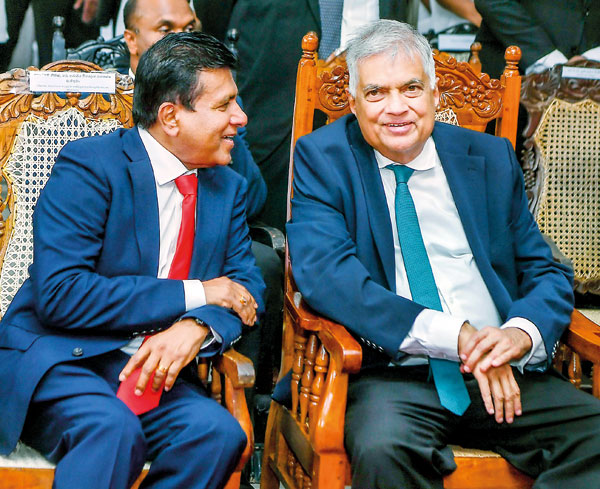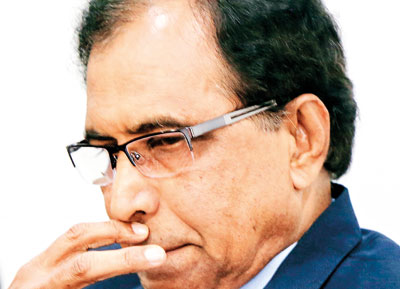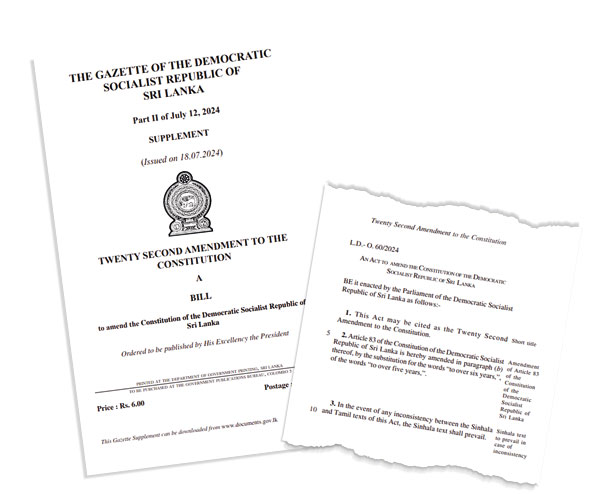Columns
- Wickremesinghe to contest as independent candidate; SLPP awaits formal letter on policy matters before declaring support
- Rishad’s ACMC to back Wickremesinghe; as President gradually increases campaign momentum
- In SLPP circles, speculation rife over conduct of parliamentary elections soon: Polls Chief says ready for any situation
By Our Political Editor
As leaders of the Sri Lanka Podujana Peramuna (SLPP) still await a formal intimation from President Ranil Wickremesinghe about his candidature at the upcoming presidential elections, speculation is growing in their circles about a possible parliamentary election.
Whether such an election will follow immediately after the presidential election or in the later weeks is not clear. Technically, however, Election Commission Chairman, R.M.A.L Ratnayake told a news conference on Wednesday, “If such a situation arises, the Commission will discuss it and take suitable steps. The Commission has the capability to have any election at any given time. Currently, it is the Presidential election that should be held, as the president’s term officially ends on November 18. If another election is called, the Commission can discuss it and conduct the election.” Of course, he was responding to a hypothetical question.
The cause for the speculation is a breakfast meeting by a politically important foursome on July 10 as reported in these columns. It was former President and SLPP leader Mahinda Rajapaksa who asked President Wickremesinghe whether he would hold the presidential election. He replied assertively that he would and added he needed space to put in place another election. Rajapaksa neither asked nor did the President disclose what it was. Others taking part were SLPP founder Basil Rajapaksa and the President’s Chief of Staff, Sagala Ratnayake.

President Wickremesinghe and Justice Minister Wijeyadasa Rajapakshe at the opening of a courts complex in Galle last Friday.
The need to query President Wickremesinghe on the presidential election has become somewhat obsolete from July 17. Even if he has not called for one in keeping with his powers, that is the date on which presidential election laws take effect. Elections Chief Ratnayake told the presser on Wednesday, “The Constitution is very clear that the Presidential election should be held between September 17 and October 16. The first task is to make the announcement of the Presidential election. The nominations should be accepted within 16 to 21 days of the announcement. Since nominations are accepted the election should be held between four to six weeks.
This week, he held discussions with representatives of the United National Party (UNP) and later with the SLPP. Thereafter, the Commission members, barring one who was travelling overseas, met for a discussion. They have arrived at tentative dates for both the nominations and the presidential election. They will officially announce the date for nominations on July 24 or 26. Nominations will be held either on August 14 or 15. The presidential election will thus be held on September 21. There will be no change on this date.

Election Commission Chairman, R.M.A.L Ratnayake. Pic by Eshan Fernando
Interestingly, the date of the nomination has come as a deadline for President Wickremesinghe to intimate his candidature to the SLPP and other political parties from whom he is seeking support. Ahead of the nominations, in terms of prior arrangements he has made, Wickremesinghe is expected to write to such parties declaring that he will be an “independent” candidate. The SLPP will be the largest political block to back him. Some of its ministers are already in favour of Wickremesinghe. Besides the UNP, which remains in a disorganised state, other parties are remnants from those who left the SLPP. One is the New Alliance of Nimal Lanza, MP from the Gampaha district. It has tied up with the Sri Lanka Freedom Party (SLFP) faction of Minister Nimal Siripala de Silva. Another backer will be the All Ceylon Makkal Congress (ACMC) led by Rishad Bathiudeen. He joined President Wickremesinghe yesterday when he left on a helicopter flight from Colombo to Batticaloa for an event at a private Muslim university under M.L.A.M. Hisbullah, a former deputy minister. The event will focus on Muslims in the area. Also joining in was onetime minister, Ravi Karunanayake.
The SLPP leadership plans to place President Wickremesinghe’s letter before their politbureau. “We may, if the need arises, discuss with him the policies he stands for. Thereafter, we will seek his assurance on adherence to the key principles that the SLPP stands for,” said a senior member who did not wish to be identified. “Such a request is being placed to convince our rank and file that a new President to be elected will also stand for our policies. That is to assure our rank and file,” he said. This will see the birth of a campaign apparatus of the parties that are backing Wickremesinghe.
Crisis over constitutional amendment
Another political development of significance came on Friday when President Wickremesinghe, for the first time, over-ruled a line minister in his Cabinet. Justice and Constitutional Affairs Minister Wijeyadasa Rajapakshe had jointly placed a cabinet memorandum together with President Ranil Wickremesinghe for the introduction of an amendment to the Constitution. This was to rectify an anomaly in the Sinhala text which said that the term of the President would be six years. However, the English and Sinhala versions had said it was five years. The idea behind the move, a government source said, was to set the record right but the timing seems to have brought in its wake mounting criticism that the move was intended to put off the presidential election.
Minister Rajapakshe had issued a directive to his ministry secretary not to print the Gazette incorporating the Constitutional amendment in the form of a Bill to be presented in Parliament. Thereafter instructions had gone out to Government Printer Ganga Kalpana Liyanage not to go ahead with printing. Contrary to claims, President Wickremesinghe has not been consulted before such a directive was issued. It is known that Rajapakshe wants to be a candidate in the upcoming presidential election.
The draft Bill titled the 22nd Amendment to the Constitution has now been gazetted. It said: “Article 83 of the Constitution of the Democratic Socialist Republic of Sri Lanka is hereby amended in paragraph (b) thereof, by the substitution of the words “to over six years,” of the words “to over five years.”
“In the event of any inconsistency between the Sinhala and Tamil texts of this Act, the Sinhala text shall prevail.”
Now that the Bill has been gazetted, the logical next step will be for it to be placed before Parliament. It will require approval by two-thirds voting in favour. Thereafter, within thirty days, a referendum will have to be held to obtain the views of the people. That such an exercise, amidst the holding of a presidential election, is what has caused confusion. After all, the Supreme Court, the highest judicial body in the country, has held that the term of the President will be five years and not six. So much so, President Wickremesinghe has also endorsed the position that the term was five years. Why then is the directive to go ahead and publish the draft Constitution Amendment Bill and present it to Parliament? At least two different sources who are familiar with the developments said it was done to deliver a strong message about the usurpation of presidential powers by the Justice Ministry.

They said that the gazetting of the Bill was done to show that it was the prerogative of the President. Both sources confirmed that the draft 22nd Amendment will be presented to Parliament and debated but the government has no plans to push ahead any further. Since he assumed the office of presidency two years ago, this is the first time that President Wickremesinghe has publicly overruled a cabinet minister over a policy matter. Minister Rajapakshe was present when President Wickremesinghe declared open a new courts complex in Galle on Friday. The two sources also noted that it was two presidential candidates who were responsible for Cabinet approving the draft 22nd Amendment. The Presidential Media Division also put out a tacit statement on the issue. It said, “President Ranil Wickremesinghe stated that Sri Lanka is unique in maintaining democracy following universal suffrage, adding that he is dedicated to preserving this democratic tradition and emphasising that there should be no fear regarding the constitutional amendment.” How much doubt remains in the public mind is a question.
Speaking at the Galle event on Friday, President Wickremesinghe said he was apologising to the public for the lapse on the part of President’s Counsel Jayampathy Wickremeratne, who was responsible for the different versions of the presidential term office in the Constitution. He said Wickremeratne was inexperienced.
Wickremeratne said: “I wish to set the record straight. Presidential candidate Maithripala Sirisena signed a memorandum of understanding with a group of 49 political parties and organisations headed by the Venerable Maduluwawe Sobitha Nayaka Thero at Viharamaha Devi Park, in which he pledged to abolish the Executive Presidency altogether. However, the very next day, he signed another MOU with the Jathika Hela Urumaya, in which he pledged not to make any constitutional change requiring a referendum. Sirisena’s election manifesto also stated that no constitutional reform necessitating a referendum would be initiated.
“Soon after being sworn in, President Sirisena appointed Ranil Wickremesinghe as Prime Minister. Constitutional affairs were Gazetted as a subject under Prime Minister Wickremesinghe. A Cabinet sub-committee headed by Premier Wickremesinghe was appointed to oversee the Nineteenth Amendment process. The five-member team that prepared the initial draft comprised three retired officials who had served in very senior positions in the Legal Draftsman’s Department, me and another lawyer. The entire drafting process was carried out on the basis that the Bill should not be placed for approval at a referendum, in keeping with President Sirisena’s electoral pledge. While the terms of the President and Parliament were proposed to be reduced from six to five years, the upper limit of six years was not touched as that would require a referendum. Article 83 of the Constitution mandates that a Bill that seeks to amend or is inconsistent with Articles listed or the said upper limits would be required to be passed by a two-thirds majority in Parliament and approved by the People at a referendum. It is essential to note that Article 83 itself is included in the list of provisions requiring a referendum.
“The several drafts prepared were all shared and discussed with the Cabinet sub-committee. The draft finally approved by the Cabinet sub-committee was then sent to the Legal Draftsman, who took over as required by law and made some changes. It was then sent to the Attorney-General, who took the view that certain clauses, especially some that reduced the powers of the President, would require a referendum. Prime Minister Wickremesinghe had several meetings with the Attorney General to discuss the matter. I participated in one such meeting. Several changes had to be made to the Bill because of the Attorney-General’s position.

“Prime Minister Wickremesinghe presented the Bill to Parliament. When it was challenged in the Supreme Court, the Attorney-General argued on behalf of the Government that no provision required a referendum. The clauses that the Supreme Court held to require a referendum were either amended or withdrawn in Parliament. Considering the above, I regret that President Wickremesinghe has thought it fit to place the entire blame on me for not reducing the upper limits of the President’s and Parliament’s terms. I reiterate that the entire amendment process was based on avoiding a referendum following President Sirisena’s pledge at the presidential election.”
Wickremesinghe’s campaign
Even if he has not declared his candidature, President Wickremesinghe has embarked on an election campaign of sorts. During speeches, he vented heavy criticism against his onetime ally and now political archival, Sajith Premadasa. He challenged that Premadasa should disclose from where he received money to buy buses to be donated to schools. If he was able to do so, President Wickremesinghe said he would lift the ban placed on his UNP membership and he could be re-instated as a member. Sajith Premadasa did not respond to many calls and messages to him. Hence, a response from him could not be obtained.
Election Commission Chairman R.M.A.L. Ratnayake’s presser this week gave the salient points related to the presidential election. He said there is an unprecedented interest. Some of the highlights:
- In deciding the date of the elections we should make sure that there is sufficient time for the candidates to conduct their campaigns. There are also series of official duties which need to be performed. These include postal voting. Also the date for voting should be a convenient day for the voters as well.
- The day of nominations should be decided taking into consideration the traditions of the country where auspicious times are looked into. Inauspicious times (Rahu Kalaya) is avoided in selecting a time for the nominations. The nominations are accepted from 9.00 a.m. to 11.00 am. There is half an hour for objections. Therefore taking all these factors into consideration, a suitable day is selected.
- We have to make it clear that there is no other reason that is taken into consideration in announcing the date of the elections. I have seen social media and other reports questioning as to why the election cannot be announced on the first available opportunity. We can go on until August 20 to make this announcement, but we will be making the announcement before the end of the month.
- We have also certified the voters register with 17.1 million voters. This will be used for the presidential election. It includes the supplementary list with names of those who completed 18 years of age as at May 31, 2024.
- The general work related to elections has commenced now. We are doing a survey on the required staff and vehicles while making estimates of the requirements of other logistics with discussions with the Ceylon Electricity Board and the Transport Board. We will also implement the campaign finance laws. Discussions are underway with the Police, Inland Revenue, Attorney Generals Depart and the Bribery Commission.
- For the 2015 presidential election the expenditure was Rs 2.7 billion, in the 2019 Presidential election it was Rs 4.5 billion. Therefore with the inflation and increase in prices we have been given an estimate of Rs 10 billion. We feel the money should be sufficient. The allocation has been made and it is usually reimbursed depending on the requirement. Already some of the money has been reimbursed.
- There have been some attempts to file action in courts and delay the election. The Election Commission has made its position known to courts. The Attorney General’s Department represented by a Senior Additional Solicitor General made representations on behalf of the Commission. We had met the AG earlier on this issue and our opposition was conveyed.
- I explained this earlier. Constitutionally the time frame has been laid down. We have taken into consideration all factors in announcing the date for the elections keeping with the Constitutional provisions.
- Like in previous elections the asset declarations of the candidates have been called for. They are retained by the Commission. If the necessity arises, they could be checked.
- The President constitutionally has the power to dissolve Parliament. If that situation arises, the Commission will discuss the situation and take suitable steps. The Commission has the capability to have any election at any given time. Currently it is the presidential election that should be held, as the President’s term officially ends on November 18. If another election is called the Commission can discuss it and conduct the election.
Though a larger number of candidates are due to contest the presidential election, the formidable front-runners will be mainly three. They are President Ranil Wickremesinghe, who is yet to formally announce his candidature, Samagi Jana Balavegaya (SJB) leader Sajith Premadasa, and Janatha Vumukthi Peramuna (JVP)-led National People’s Power leader Anura Kumara Dissanayake. There are at least four others due to join the fray.
Buying or selling electronics has never been easier with the help of Hitad.lk! We, at Hitad.lk, hear your needs and endeavour to provide you with the perfect listings of electronics; because we have listings for nearly anything! Search for your favourite electronic items for sale on Hitad.lk today!


Presidential election likely on September 21; EC to make announcement on July 24 or 26: Nominations on August 14 or 15
View(s):